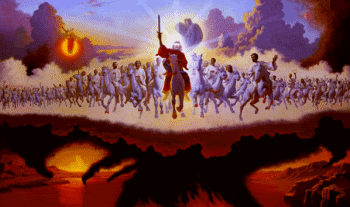August 1, 2010
Eighteenth Sunday in Ordinary Time

Luke 12: 13-21
Someone in the crowd said to Jesus, "Teacher, tell my brother to share the inheritance with me." He replied to him, "Friend, who appointed me as your judge and arbitrator?" Then he said to the crowd, "Take care to guard against all greed, for though one may be rich, one's life does not consist of possessions." Then he told them a parable. "There was a rich man whose land produced a bountiful harvest. He asked himself, 'What shall I do, for I do not have space to store my harvest?' And he said, 'This is what I shall do: I shall tear down my barns and build larger ones. There I shall store all my grain and other goods and I shall say to myself, "Now as for you, you have so many good things stored up for many years, rest, eat, drink, be merry!" But God said to him, 'You fool, this night your life will be demanded of you; and the things you have prepared, to whom will they belong?' Thus will it be for the one who stores up treasure for himself but is not rich in what matters to God."
Introductory Prayer: Lord Jesus, I believe you want me to have faith in you, faith that hearkens to your words without any second guessing. I hope in your words, not relying solely on my own strength or reasoning. I love you. You continue to astonish me by showing me that your ways are not my ways.
Petition
Lord, may I love you with all my heart, mind, soul and strength.
1. Guarding Against Greed
“Take care to guard against all greed.…” Greed arises when our heart loves material things and possessions in selfish and disordered ways. God created “things” – material reality – for a purpose: to help us fulfill our mission in this life. Our heart can grow to love these things and to love accumulating wealth for its own sake, not for the sake of using it to fulfill our mission and save our soul.
2. One Heart, One Love
Jesus has called us to “love the Lord your God with your whole heart, your whole soul, with all your strength and with all your mind.” But we only have one heart, one soul, one will and one mind. If I love material wealth in a disordered way, then my one heart, one soul, etc. will be divided and pulled in many directions simultaneously. Not only will I not be able to love God with a total, faithful, focused love, I will not be able to love anyone in this way. No matter whom I love, my love will always be weakened and diluted by a divided heart.
3. Late Have I Loved…
“Late have I loved You, O Beauty ever ancient, ever new, late have I loved You. You were within me, and I looked outside; I sought you, and miserable as I was, I longed for creatures, I was detained by the wonderful works of your hands” (St. Augustine, Confessions). What dilutes my love is disordered affection for the things God created. Our heart is capable of loving multiple persons and things (God, parents, children, friends), but only to the degree it is capable of focusing on one of them. Loving God first is like using a magnifying glass: The rays of sunlight, like the affection and love we have for numerous persons and things, are united by the glass and magnified into a more powerful beam. When we love God first, our love for others and the world increases in intensity.
Conversation with Christ
Lord, you created my heart to love. Often I fall in love with the things you created. I can even begin to love them more than you, to forget that you are their Creator and that you have given them to me to lead me to you. Help me to love you above them all, and to thank and bless you in a thousand ways.
Resolution
Today I will take stock of my loves to make sure they don’t compete with my love for God.
Challenge
Take stock of your loves to make sure they don’t compete with my love for God.
Father Patrick Murphy, LC
Catholic.net
Bkg. Courtesy of
Christian Backgrounds














